| Revision as of 14:06, 18 February 2013 editStanProg (talk | contribs)Extended confirmed users1,557 edits →Biography: +Zlatarski← Previous edit | Revision as of 14:16, 18 February 2013 edit undoStanProg (talk | contribs)Extended confirmed users1,557 editsm Central Macedonian dialectNext edit → | ||
| Line 34: | Line 34: | ||
| }} | }} | ||
| '''Krste Petkov Misirkov''' ({{lang-bg|''Кръстьо Петков Мисирков''}}; {{lang-mk|''Крсте Петков Мисирков''}}) (born 18 November 1874 in Postol, ] (today ], Greece); died 26 July 1926 in ], ]) was a ], ], historian, ], ] author of the first book and scientific magazine in Macedonian<ref>: ''"After the failure of the Ilinden rebellion, Misirkov returned to St. Petersburg, and in 1905 he launched the journal Vardar in Macedonian."''</ref><ref>: ''"iас и iе написаф на централното македонцко наречiе, коiе за мене от сега на тамо имат да бидит литературен македонцки iазик."''</ref><ref></ref> where he for the first time outlined the principles of the literary ].<ref></ref><ref></ref><ref name="lorring"/> He is one of the most outstanding names in the ] and ].<ref></ref> | '''Krste Petkov Misirkov''' ({{lang-bg|''Кръстьо Петков Мисирков''}}; {{lang-mk|''Крсте Петков Мисирков''}}) (born 18 November 1874 in Postol, ] (today ], Greece); died 26 July 1926 in ], ]) was a ], ], historian, ], ] author of the first book and scientific magazine in Central Macedonian dialect<ref>: ''"After the failure of the Ilinden rebellion, Misirkov returned to St. Petersburg, and in 1905 he launched the journal Vardar in Macedonian."''</ref><ref>: ''"iас и iе написаф на централното македонцко наречiе, коiе за мене от сега на тамо имат да бидит литературен македонцки iазик."''</ref><ref></ref> where he for the first time outlined the principles of the literary ].<ref></ref><ref></ref><ref name="lorring"/> He is one of the most outstanding names in the ] and ].<ref></ref> | ||
| A part of his writings is central to the development of ethnic ], the issue of the existence of a ] distinct from the Bulgarian nation. He published one book, one magazine and over thirty articles. However, at different points in his life, Misirkov expressed conflicting statements about the ethnicity of the ] living in ], including his own ethnicity, calling them ], ] or ] respectively. As a result, both his ethnic attachment and legacy remains a matter of dispute among some historians from Bulgaria and Republic of Macedonia. | A part of his writings is central to the development of ethnic ], the issue of the existence of a ] distinct from the Bulgarian nation. He published one book, one magazine and over thirty articles. However, at different points in his life, Misirkov expressed conflicting statements about the ethnicity of the ] living in ], including his own ethnicity, calling them ], ] or ] respectively. As a result, both his ethnic attachment and legacy remains a matter of dispute among some historians from Bulgaria and Republic of Macedonia. | ||
Revision as of 14:16, 18 February 2013
| Krste Petkov Misirkov | |
|---|---|
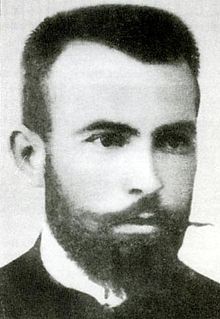 Portrait of Krste P. Misirkov Portrait of Krste P. Misirkov | |
| Born | Krste Petkov Misirkov (1874-11-18)18 November 1874Expression error: Unrecognized word "november". Postol, Ottoman Empire (today Pella, Greece) |
| Died | (1926-07-26)26 July 1926Expression error: Unrecognized word "july". Sofia, Kingdom of Bulgaria (today Bulgaria) |
| Pen name | "K.Pelski" |
| Occupation | philologist, slavist, historian, ethnographer, publicist, translator and professor. |
| Education | Doctor's degree of philology and history |
| Alma mater | Faculty of philology and history at the University of Petrograd |
| Genre | history, linguistics, philology, politics, ethnography and analytic. |
| Subject | Macedonian history, language and ethnicity, Balkan history |
| Literary movement | Macedonian scientific-literary association "St. Clement" |
| Notable works | "On Macedonian Matters", the magazine "Vardar", over 30 articles published in different newspapers. |
| Spouse | Ekaterina Mihajlovna - Misirkova |
| Children | Sergej Misirkov |
| Relatives | Kata Misirkova - Rumenova |
| Signature | |
 | |
Krste Petkov Misirkov (Template:Lang-bg; Template:Lang-mk) (born 18 November 1874 in Postol, Ottoman Empire (today Pella, Greece); died 26 July 1926 in Sofia, Kingdom of Bulgaria) was a philologist, slavist, historian, ethnographer, publicist author of the first book and scientific magazine in Central Macedonian dialect where he for the first time outlined the principles of the literary Macedonian language. He is one of the most outstanding names in the Macedonian culture and history.
A part of his writings is central to the development of ethnic Macedonian nationalism, the issue of the existence of a Macedonian nation distinct from the Bulgarian nation. He published one book, one magazine and over thirty articles. However, at different points in his life, Misirkov expressed conflicting statements about the ethnicity of the Slavic population living in Macedonia, including his own ethnicity, calling them Bulgarians, Macedonians or Macedonian Bulgarians respectively. As a result, both his ethnic attachment and legacy remains a matter of dispute among some historians from Bulgaria and Republic of Macedonia.
Biography
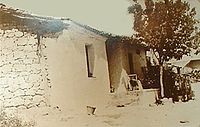

Krste Petkov Misirkov was born on 18 November 1874 in the village of Postol, Ottoman Empire. He started his elementary education in the local Greek school, where he was studying until the sixth grade elementary school, but the bad financial situation of his family could not support his further education at that point and he left the school. At that period Serbian propaganda began to promote its variant of "Macedonism" and to recruit young people in order to "Serbianize" them. After some period without proper education, Misirkov applied and was granted a scholarship by the Serbian association "St. Sava".
Misirkov spent some time in Serbia, where he was studying in Serbian, and soon after he realized that the propaganda was the main goal of the Serbian association. That politics practiced by the association, forced the Misirkov and the other Macedonian students to participate in a students' revolt against the Saint Sava society. As a result of that, Misirkov and other companions moved from Belgrade to Sofia. Since he faced up with similar situation in Bulgaria, i.e., another propaganda, Misirkov again went to Serbia to continue his education, but without any success because he was rejected by the "St. Sava" association. Since he was willing to get higher education, he was forced, by a chain of events, to enroll a theological school for teachers. Similar to the association "St. Sava", this school as well had its own propagandistic goals and that resulted in another revolt of the students. As a result of it, the school stopped working and the students were sent throughout Serbia. Misirkov was sent to Šabac, where he finished the last, fourth, class of secondary education, but this time in the local gymnasium. In both, Serbia and Bulgaria, Misirkov and his friend were treated as Serbians or Bulgarians in order to be accepted in the educational system. After the gymnasium, even though he graduated, Misirkov enrolled in another secondary school for teachers in Belgrade, where he graduated in 1895. During this time, particularly in 1893, Misirkov founded an association of students called "Vardar". Its charter included, among other things, the aim of studying and spreading a knowledge of their country as regards its geographical, ethnographic and historical aspects and the cardinal principle of its program was that Macedonia should belong to the Macedonians. In other words, the students were not satisfied by the Serbianization of the Macedonians. This idea was inspired by the Macedonians/Macedonian Bulgarians in Sofia called "Lozari". However, the Serbs were opposed to this thesis of the young students, so their society did not last very long and it was disbanded in 1895. Afterwards he was appointed as a Serbian teacher in Pristina. Misirkov refused and left for Odessa to continue his studies.
His educational qualifications obtained in Belgrade were not recognized in Russia. Misirkov had to study from the very beginning in the Seminary at Poltava. In 1897 he was able to enter the Petersburg University. Here he entered at first the Bulgarian Students Association. Misirkov carried out here his first scholarly lecture on the ethnography and history of the Balkan Peninsula before the members of the Russian Imperial Geographical Society. In 1901, he moved to the University of Odessa. Of great importance to Misirkov was the founding of the Macedonian Scientific and Literary Society in Petersburg. Its creation was influenced by the Macedonian Club founded in Belgrade. After the Club was closed, its chief founders left for the Russian capital, where they organized the new Macedonian Society. This foundation in 1902 became the most important Macedonian institution abroad. In the same year this Society sent a special Memorandum to the Great Powers, in which the Macedonian Question was examined from the national point of view. It was proposed also Macedonian literary language to be codified. The question was also examined of establishing a Macedonian Church under the Ohrid Archbishopric. The aim of this Memorandum was that the Macedonians should be recognized as a separate nation and that Macedonia should be granted full autonomy within the Ottoman Empire.

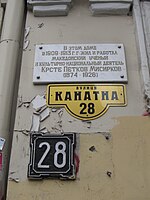
Later Misirkov abandoned the University and left for Ottoman Macedonia. Facing financial obstacles to continue his postgraduate education, he accepted the proposal of the Bulgarian Exarchate to be appointed teacher in a high school in Bitola. There he became friendly with the Russian consul in Bitola. He began to plan opening of local schools and publishing textbooks in Macedonian language. But the Ilinden Uprising in 1903 and the assassination of the Russian Consul changed his plans and he returned to Russia. There Misirkov published different articles about the Ilinden Uprising and the reasons why the Consul was assassinated. Soon afterwards he wrote the brochure "The Macedonian matters" and published it in Sofia. This book, was written in the Macedonian language, and Misirkov attacked in his writings both, the Bulgarian Exarchate and the Internal Macedonian-Adrianople Revolutionary Organization (IMARO) as pro-Bulgarian creations. As result, he was persecuted by IMARO, and it is believed its members destroyed a lot of copies of his book. In 1905 he left for Berdiansk in Southern Russia. There he resumed publication of the journal "Vardar" and worked as Bulgarian teacher. In many of his next articles after 1905 Misirkov exposed pro-Bulgarian views and even categorically renounced the point of his book "The Macedonian matters". On 18 April 1907 Misirkov began to cooperate with the issued in Sofia magazine Macedonian-Adrianople Review, edited by Nikola Naumov, which was de facto organ of the IMARO. On 24 April 1909 K. Missirkov printed in Odessa in a separate booklet his work "South Slavic epic legends of the marriage of King Volkashin in connection with the question of the reasons for the popularity of Krali Marko among the South Slavs". On 1 October 1909 he printed the article, "The foundations of a Serbian-Bulgarian rapprochement" in the Magazine "Bulgarian collection" edited by Bulgarian diplomats in St. Petersburg. By the time, a Slavic Festival was held in Sofia in 1910 and Missirkov was attend as its guest of honor. In 1910–1911, he translated from Bulgarian to Russian the book of the Bulgarian geographer Prof. Atanas Ishirkov "Bulgaria".
When the First Balkan war was declared, Misirkov went to Macedonia as a Russian war correspondent. There he could follow the military operations of the Bulgarian Army. Misirkov published a series of articles in the Russian press and some articles demanding that the Ottomans should be driven out of Macedonia. In 1913 after the outbreak of the Second Balkan war Misirkov went back to Russia, where he worked as a teacher also in the Bulgarian schools in Odessa. Here he wrote his diary, which was found in 2006. Later he was appointed teacher of the Bulgarian school at Kishinev. While working as a teacher in Kishinev, Misirkov sent а letter to the Bulgarian academic Aleksandar Teodorov-Balan with a request to be assigned as a professor at Sofia University. That request clearly indicates his self-identification at that time - As a Bulgarian, I would willingly return to Bulgaria, if there is a need of a scientific research of the fate of the Bulgarian lands, especially Macedonia.. A shorter letter with similar content was sent to another professor at Sofia University - Vasil Zlatarski with the request to be assigned as a chosenat the newly established department for history of Macedonia and the other western Bulgarian lands.
At that point, Misirkov made contacts with the Macedonian Scientific and Literary Society, which started publishing the magazine "Macedonian Voice" in Russian. Misirkov was publishing in this magazine for some period under the pseudonym "K. Pelski".
After the outbreak of the First World War in 1914 Bessarabia became a republic, and he was elected a member of the local parliament Sfatul Ţării as a representative of the Bulgarian minority. At the same time, Misirkov worked as a secretary in the Bulgarian educational commission in Bessarabia. However, the Parliament was forced to declare the annexation of Bessarabia to Romania in April 1918. Еxpelled by the Romanian authorities, at the end of 1918 Misirkov returned to Sofia, where he spent one year as a head of the Historical department of the National Museum of Ethnography. Then, he worked as a teacher and director of the high schools in Karlovo and Koprivshtitsa. During this period (but before 1923) the Internal Macedonian Revolutionary Organization (IMRO) apparently marked Misirkov as harmful to its cause and supposedly considering his assassination, but reconsidered after he met with a representative of the organization. He also resumed his journalistic activity and published many articles on the Macedonian Question in the Bulgarian press. Misirkov died in 1926 and was buried in the graveyards in Sofia with the financial support of 5000 levs from the Ministry of Education, as an honoured educator.
Works
In his life, Misirkov wrote one book, one diary, published one issue of a magazine and wrote more than thirty articles. His book "On Macedonian Matters" was published in Sofia in 1903. The magazine was called "Vardar" and was published in 1905 in Odessa, Russian Empire. The articles that Misirkov wrote have been published in different newspapers and they were focused on different topics.
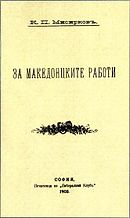
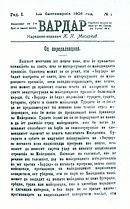

On the Macedonian Matters
Misirkov's most important writing is undoubtedly the book Za makedonckite raboti (On Macedonian Matters) published in 1903 in Sofia, in which he laid down the principles of the modern Macedonian language. According to this book, the Macedonian language should be based on dialects from the central part of Macedonia which are the Veles, Prilep, Bitola and Ohrid dialects. He also used those dialects in the book itself. Most copies of the book were confiscated and destroyed by the Bulgarian police and IMRO activists, shortly after the book was published. At his own time, the book had little or no impact and did not become popular until the middle of the 1940s. Misirkov's principles played a crucial role in the future codification of the Macedonian language, right after World War II.
The magazine Vardar
Besides On Macedonian Matters, Misirkov is author of the first scientific magazine on Macedonian language. The magazine "Vardar" was published in 1905 in Odessa, Russian Empire. The magazine was published only once, because of the financial problems that Misirkov had been facing with at that time. "Vardar" has been published on Macedonian language, and the orthography that has been used is almost same as the orthography of the standard Macedonian language.
The magazine was meant to include several different scientific disciplines, mostly concerned with Macedonia. The first section of the magazine is made of the introduction, where in general Misirkov elaborates the aims of the magazine and this section was in Macedonian and Russian. The next section of the magazine is the literary section, where Misirkov translated into Macedonian the poem "Traveler" by the Croatian poet P. Preradovic. After the literary section, the magazine includes an analysis about the Balkan propagandas in Macedonia, followed by a political analysis of some of the global events in that period. The last section is statistics, which shows the Macedonian population in Macedonia.
Articles
During his life, Misirkov published many articles for different newspapers and magazines. The articles deal with Macedonia, Macedonian culture, ethnology, politics and nation on one hand and with the Bulgarian nation, politics and ethnography on the other. Misirkov published his articles in Macedonian, Russian and Bulgarian and he published them either in Russia or in Bulgaria. Most of the articles were signed by his birth name, but there are articles that are signed with his pseudonym K. Pelski.
Diary
In 2006, a handwritten diary by Misirkov written during his stay in Russia in 1913 was discovered. It was declared authentic by Bulgarian and Macedonian experts and was published in 2008. The content of the diary clearly shows that at the time, Misirkov was a Bulgarian nationalist. It has given rise to new public discussion over Misirkov's stances on Bulgarian and Macedonian ethnicity. The manuscript, includes 381 pages written in Russian language. Misirkov wrote it in Odessa's nearby village of Klimentove, where he lived and worked at the time. It contains also articles and excerpts from the Russian press of that time.
Contribution to Bulgarian dialectology and ethnography
In several publications Misirkov made an attempt to determine the border between the Serbo-Croatian and Bulgarian languages, including in the Bulgarian dialect area nearly all of Torlakian and Macedonian dialects. Misirkov pointed there, that the population in Pomoravlje is autochthonous and Bulgarian by origin, excluding any later migrations during the Ottoman rule from Bulgaria. According to Krste Misirkov, Krali Marko epic songs in Serbia, the so-called Bugarstici are a result from Bulgarian musical influence over the Serbian folk music.
Controversies about Misirkov's ethnicity and views
During the second half of the 19th century and the beginning of the 20th century the idea of a separate Macedonian ethnicity was as yet promoted only by some circles of intellectuals. Then, most of the Slavic people in Macedonia considered themselves Bulgarian, and this idea failed to gain wide popular support. At different points in his life, Misirkov expressed conflicting statements about the ethnicity of the Slavs living in Macedonia, including his own ethnicity. While Misirkov's work and personality remain highly controversial and disputed, there have been attempts among international scholars to reconcile the conflicting and self-contradictory statements made by Misirkov. According to Croatian Ivo Banac, professor of history at Yale University Misirkov viewed both himself and the Slavs of Macedonia as Bulgarians, and espoused pan-Bulgarian patriotism in a larger Balkan context, and especially with regard to Serbian and Greek hegemonism in Macedonia. However, in the context of the larger Bulgarian unit/nation, Misirkov sought both cultural and national differentiation from the Bulgarians and called both himself and the Slavs of Macedonia Macedonians.
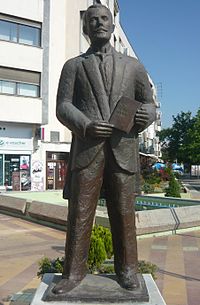

View of Misirkov in Bulgaria
In Bulgaria Misirkov is regarded as a controversial educator with scientific contribution to Bulgarian dialectology and ethnography. He graduated from the Belgrade University as a student of Prof. Stojan Novaković and was influenced by his ideas. At that time Novaković was a prominent proponent of the Macedonism, thereby promoting Serbian interests in the region of Macedonia. Afterwards Misirkov met several times with him and Novaković's diplomatic activity in St. Petersburg played significant role for the foundation of the Macedonian Scientific and Literary Society. However, after 1906 Misirkov rejected these ideas, opposng the Serbian theory about the "floating mass" of the "Macedonian Slavs" and even developed a kind of Serbophobia. In this period he became evidently bulgarophile and argued that the Slavic population of Macedonia was not "a formless paste" but a "well baked Bulgarian bread". Bulgarian historians believe that his writings were significantly altered by the post-WWII Yugoslavian Communist regime to support the notion of a "Macedonian nation", distinct from the Bulgarian one. Bulgarians also note that Misirkov worked as Bulgarian teacher in Russia, was Bulgarian deputy in Bessarabia, choose Bulgarian citizenship, lived and died in Bulgaria and worked there until his death in 1926. Nevertheless, Bulgarian scholarship points that despite the fact, that Misirkov in many cases defended the cause of Bulgarian nationalism, he several times switched during the 1920s, from Bulgarian to Macedonian one, and vice a versa. According to Bulgarian observers after the breakup of Yugoslavia in the Republic of Macedonia also have arosen polemics about the identity of Misirkov. The most popular Misirkov's thought in Bulgaria is:
Whether we call ourselves Bulgarians or Macedonians, we have always maintained a separate, unified and different from the Serbs ethnicity, with Bulgarian consciousness, which will entail the fight for the human rights of the Macedonian.
View of Misirkov in the Republic of Macedonia
In the Republic of Macedonia, Misirkov is regarded as the most prominent Macedonian publicist, philologist and linguist who set the principles of the Macedonian literary language in the early 20th century. In some of his writings he identifies the Macedonians as separate nation and the Macedonian as a separate South Slavic language. Also, Misirkov is the author of the first scientific magazine in Macedonian and because of his contributions to the Macedonian national cause, he is regarded as the greatest Macedonian of the 20th century. In his honor, many books and scientific works have been published and the Institute for Macedonian language "Krste Misirkov" is named after him.
There is not an important debate about Misirkov's ethnicity in Macedonia, since he is always regarded as Macedonian as it is obvious in most of his major writings. Since he was not allowed to live in work in Macedonia by the Yugoslav authorities, unwillingly he remained in Bulgaria where he got Bulgarian citizenship since he needed it for his job. Regarding Misirkov's signature under the phrase "Macedonian Bulgarian", the Macedonian historians and linguists argue that it means nothing but a Macedonian person with a Bulgarian citizenship, in a political sense, or just a Macedonian person living in Bulgaria. The most quoted and most popular Misirkov's thought in Macedonia is:
We are obliged to caress our language, because it is ours, just as much as our fatherland.
I am Macedonian and the interests of my fatherland are: not Russia and Austria-Hungary are enemies of Macedonia, but Bulgaria, Greece and Serbia.
Misirkov family

| n/a | n/a | ||||||||||||||||||||||||
| Ekaterina Misirkova | Krste Misirkov | Lazar Misirkov | |||||||||||||||||||||||
| n/a | {{{#}}} | Sergej Misirkov | |||||||||||||||||||||||
| n/a | {{{#}}} | Boris Misirkov | |||||||||||||||||||||||
Footnotes
- Macedonia and Greece: The Struggle to Define a New Balkan Nation, John Shea, p. 204: "After the failure of the Ilinden rebellion, Misirkov returned to St. Petersburg, and in 1905 he launched the journal Vardar in Macedonian."
- On the Macedonian Matters, Misirkov, 1903: "iас и iе написаф на централното македонцко наречiе, коiе за мене от сега на тамо имат да бидит литературен македонцки iазик."
- Мисирков е еден од најголемите Македонци
- Pluricentric languages: differing norms in different nations, Michael G. Clyne, Walter de Gruyter, 1992, ISBN 3-11-012855-1, p. 440.
- South Slavic Discourse Particles Pragmatics and Beyond. New Series, Mirjana N. Dedaić, Mirjana Miskovic-Lukovic, John Benjamins Publishing Company, 2010, ISBN 90-272-5601-2, pp. 12–13.
- ^ The Macedonian Conflict: Ethnic Nationalism in a Transnational World, Loring M. Danforth, Editor: Princeton University Press, 1997, ISBN 0-691-04356-6,p. 64.].
- Misirkov's biography
- ^ "Biography of Krste Petkov Misirkov". Retrieved 6 February 2011.
- ^ Literature of the Macedonian language, Georgi Stalev, Skopje
- Антони Гиза, Балканските държави и македонския въпрос
- Macedonian language and nationalism during 19 and early 20 century, Victor Friedman, p. 286
- По нивна инициатива првен се образуа во зафатоко на деветдесетите години. Једно национално сепаратистично движеiн'е со цел'а да се оддел'ат интересите на македонците од бугарцките со возведуаiн'е на iедно од македонцките наречиiа на степен на литературен iазик на сите македонци. Орган на тоа сепаратитстко движеiн'е на македонците во Бугариiа беше журналот „Лоза".”. Но тоа дуовно движеiн'е на македонците не се ареса на бугарцкото стамболовцко праител'ство, коiе забрани да се издаат „Лоза" и зафати да гонит македонците сепаратисти., 'On the Macedonians Matters, Krste Misirkov, Sofia, 1903.'
- Nationalism, Globalization, and Orthodoxy: The Social Origins of Ethnic Conflict in the Balkans, Victor Roudometof, Roland Robertson, p. 145
- Macedonian historiography often refers to the group of young activists who founded in Sofia an association called the ‘Young Macedonian Literary Society’. In 1892, the latter began publishing the review Loza which promoted certain characteristics of Macedonian dialects. At the same time, the activists, called ‘Lozars’ after the name of their review, ‘purified’ the Bulgarian orthography from some rudiments of the Church Slavonic. They expressed likewise a kind of Macedonian patriotism attested already by the first issue of the review: its materials greatly emphasized identification with Macedonia as a genuine ‘fatherland’. In any case, it is hardly surprising that the Lozars demonstrated both Bulgarian and Macedonian loyalty: what is more interesting is namely the fact that their Bulgarian nationalism was somehow harmonized with a Macedonian self-identification that was not only a political one but also demonstrated certain ‘cultural’ contents. "We, the People: Politics of National Peculiarity in Southeastern Europe", Diana Miškova, Central European University Press, 2009, ISBN 9639776289, p. 120.
- "Though Loza adhered to the Bulgarian position on the issue of the Macedonian Slavs' ethnicity, it also favored revising the Bulgarian orthography by bringing it closer to the dialects spoken in Macedonia." Historical Dictionary of the Republic of Macedonia, Dimitar Bechev, Scarecrow Press, 2009, ISBN 0810862956, p. 241.
- The Young Macedonian Literary Association's Journal, Loza, was also categorical about the Bulgarian character of Macedonia: "A mere comparison of those ethnographic features which characterize the Macedonians (we understand: Macedonian Bulgarians), with those which characterize the free Bulgarians, their juxtaposition with those principles for nationality which we have formulated above, is enough to prove and to convince everybody that the nationality of the Macedonians cannot be anything except Bulgarian." Freedom or Death, The Life of Gotsé Delchev, Mercia MacDermott, The Journeyman Press, London & West Nyack, 1978, p. 86.
- Tha Balkan states and the Macedonian question, prof. Antony Giza
- Historical dictionary of the Republic of Macedonia, Dimitar Bechev, Scarecrow Press, 2009, ISBN 0-8108-5565-8, p. 153.
- ^ Георги Маргаритов. В Скопие продължават да показват само едното лице на Кръсте Мисирков. в-к "Македония", брой 10, 10 март 1999 г.
- Трайков, Веселин (2000). Кръсте Мисирков и за българските работи в Македония. Знание, ISBN 954-621-177-X.
- К. Мисирков. „БЕЛЕЖКИ ПО ЮЖНОСЛАВЯНСКАТА ФИЛОЛОГИЯ И ИСТОРИЯ /КЪМ ВЪПРОСА ЗА ПОГРАНИЧНАТА ЛИНИЯ МЕЖДУ БЪЛГАРСКИЯ И СРЬБСКО-ХЪРВАТСКИЯ ЕЗИЦИ И НАРОДИ/“ Българска сбирка, XVII, януари 1910, кн. 1, с. 39–42; февруари 1910, кн. 2, с. 100; маи 1910, кн. 5, с. 328; г. XVIII, март 1911, кн. 3, с. 197; април 1911. кн. 4, с. 265–267.
- И. Михайлов. ИСТИНСКИЯТ ОБРАЗ НА НЕУРАВНОВЕСЕНИЯ КР. МИСИРКОВ. Избрани произведения. Съставители: Кръстю Гергинов, Цочо Билярски. Военноиздателски комплекс Св. Георги Победоносец, Университетско издателство Св. Климент Охридски, София 1993. Стр. 389–390
- ^ Трайков, Веселин (2000). Кръсте Мисирков и за българските работи в Македония. Знание. ISBN 954621177Х.
{{cite book}}: Check|isbn=value: invalid character (help) - K. P. Misirkov - Diary 5 July to 30 August 1913, Sofia-Skopje, 2008, Published by State Agency "Archives" of the Republic of Bulgaria & State Archive of the Republic of Macedonia, p. 168
- Промемория на Никола Трайков за разговор с проф. Петко Стоянов за Кръстю Мисирков, София, 8 март 1963 г.
- ЦДИА, фонд № 177, Министерство на просвещението, опис № 2, а.е.230, л.22.
- Region, regional identity and regionalism in Southeastern Europe, Klaus Roth, Ulf Brunnbauer, LIT Verlag Münster, 2008, ISBN 3-8258-1387-8, p. 139.
- p.13, "Vardar", Blaže Ristovski, Institute of Macedonian language "Krste Misirkov", Skopje, 1966.
- FOCUS Information Agency
- Нетинфо – Как "бащата на македонизма" Кръстьо Мисирков се оказа чист българин
- Diary Reveals Father of Macedonian Nation Had Bulgarian Identity, Sofia News Agency, 23 April 2008, Wednesday
- See: Мисирков, Кръстьо (1898). Значението на моравското или ресавското наречие за съвременната и историческа етнография на Балканския полуостров. Български преглед, година V, книга І, стр. 121–127; Мисирков, Кръстьо (1910, 1911). Бележки по южно-славянска филология и история (Към въпроса за пограничната линия между българския и сръбско-хърватски езици и народи), Одеса, 30.XII.1909 г. Българска сбирка.
- The Bugarstica: A Bilingual Anthology of the Earliest Extant South Slavic Folk Narrative Song (Illinois Medieval Studies) John S. Miletich, ISBN 0-252-01711-0, University of Illinois Press.
- К. Мисирков. Южнославянските епически сказания за женитбата на крал Марко сред южните славяни. Одеса, 1909. с. 6.; К. Мисирков. Народният ни епос и Македония. – Развитие, II, кн. 2–3, февруари-март 1919, с. 80.; К. Мисирков. Крали Марко. – Илинден, III, бр. 12, 25 март 1923.
- The Macedonian Question: Britain and the Southern Balkans 1939–1949, Dimitris Livanios, Oxford University Press US, 2008 ISBN 0-19-923768-9, p. 15.
- Center for Documentation and Information on Minorities in Europe, Southeast Europe (CEDIME-SE) – "Macedonians of Bulgaria".
- 154 Studia Theologica V, 3/2007, 147 – 176 Alexander Maxwell, Krste Misirkov's call for Macedonian Autocephaly: religious nationalism as instrumental political tactic.
- Krste Misirkov, On the Macedonian Matters (Za Makedonckite Raboti), Sofia, 1903: "And, anyway, what sort of new Macedonian nation can this be when we and our fathers and grandfathers and great-grandfathers have always been called Bulgarians?"
- Sperling, James; Kay, Sean; Papacosma, S. Victor (2003). Limiting institutions?: the challenge of Eurasian security governance. Manchester, UK: Manchester University Press. p. 57. ISBN 978-0-7190-6605-4.
Macedonian nationalism Is a new phenomenon. In the early twentieth century, there was no separate Slavic Macedonian identity
- The Macedonian Conflict: Ethnic Nationalism in a Transnational World, Loring M. Danforth, Editor: Princeton University Press, 1997, ISBN 0-691-04356-6,p. 64.
- Rae, Heather (2002). State identities and the homogenisation of peoples. Cambridge: Cambridge University Press. p. 278. ISBN 0-521-79708-X.
Despite the recent development of Macedonian identity, as Loring Danforth notes, it is no more or less artificial than any other identity. It merely has a more recent ethnogenesis – one that can therefore more easily be traced through the recent historical record.
- Zielonka, Jan; Pravda, Alex (2001). Democratic consolidation in Eastern Europe. Oxford: Oxford University Press. p. 422. ISBN 978-0-19-924409-6.
Unlike the Slovene and Croatian identities, which existed independently for a long period before the emergence of SFRY Macedonian identity and language were themselves a product federal Yugoslavia, and took shape only after 1944.
- The national question in Yugoslavia: origins, history, politics, Ivo Banac, Cornell University Press, 1988, ISBN 0-8014-9493-1, p. 327.
- Църнушанов, Коста. Македонизмът и съпротивата на Македония срещу него. Унив. изд. "Св. Климент Охридски", София, 1992.
- "Since the Bulgarian idea, as it is well-known, is deeply rooted in Macedonia, I think it is almost impossible to shake it completely by opposing it merely with the Serbian idea. This idea, we fear, would be incapable, as opposition pure and simple, of suppressing the Bulgarian idea. That is why the Serbian idea will need an ally that could stand in direct opposition to Bulgarianism and would contain in itself the elements which could attract the people and their feelings and thus sever them from Bulgarianism. This ally I see in Macedonism...." from the report of S. Novakovic to the Minister of Education in Belgrade about "Macedonism" as a transitional stage in Serbianization of the Macedonian Bulgarians; see idem. Cultural and Public Relations of the Macedonians with Serbia in the XIXth c.), Skopje, 1960, p. 178.
- Novaković initiated the establishment of closer Serbian-Russian relations as consul in St. Petersburg, where he supported the local macedonists as Misirkov and Chupovski, see: Angel G. Angelov, The European Legacy: Toward New Paradigms, 1470-1316, Volume 2, Issue 3, 1997, Pages 411 – 417. and the Memoirs of Hristo Shaldev, Macedonian revolutionary (1876–1962), Macedonian Patriotic Organization "TA" (Adelaide, Australia, 1993), The Slav Macedonian Student Society in St. Petersburg, pp. 14–21.
- Collective memory, national identity, and ethnic conflict: Greece, Bulgaria, and the Macedonian question, Victor Roudometof, Greenwood Publishing Group, 2002, ISBN 0-275-97648-3, p. 112.
- Region, Regional Identity and Regionalism in Southeastern Europe, Klaus Roth, Ulf Brunnbauer, Publisher LIT Verlag Münster, 2009, ISBN 3-8258-1387-8, p. 139.
- Krste Misirkov wrоtе in "Bulgarska Sbirka" – 'Bulgarian Collection' magazine, 1910–1911: "The readers of the present article will be probably surprised by the enormous controversy they encounter here when they compare the contents with what they have read or may read in my brochure On the Macedonian Matters. In order to make sense out of this controversy, they must be reminded that I acted there like an mprovised politician vis-a-vis the Macedonian Question... The entire contents of the brochure was so far from unbiased scholarship! ...The idea of a separate Macedonian nation is a lie, cunningly tailored so that the Serbs can have a right to at least a part of Macedonia."
- Мисирков има и некои чисто расистички ставови за Србите. Вели, дека тие биле “шумадински овчари”. Дека Србија била заснована од “свинскиот трговец Караѓорѓе”, дека истава Србија била “единствен виновник за ропството на македонските Бугари”. Зборува за некаква карактеристичка црта на “српските овчари – цареубијци”. Вели дека Србите поробиле “вековната бугарска култура во Македонија”. Како илустрација се даваат писмата на Мисирков до министерот за надворешни работи на Русија, каде што се апелира „македонските Бугари“ да се оттргнат од јаремот на „шумадиските свињари“, а поентира со тоа дека „никогаш нема да престанеме да се чувствуваме Македонци или што е едно те исто – македонски Бугари“.
- Македонизмът и съпротивата на Македония срещу него Коста Църнушанов, Унив. изд. "Св. Климент Охридски", София, 1992 г. стр. 42.
- д-р Растислав Терзиоски „За некои ставови на К. П. Мисирков за македонското прашање (дилеми и толкувања), Зборник на МАНУ „Делото на Крсте Мисирков“, том 1 од Меѓународниот собир по повод стогодишнината од излегувањето на книгата „За Македонцките работи“ (Скопје 2005), стр. 87–90.
-
"Истинският образ на неуравновесения Кръсте Мисирков – Иван Михайлов, 1969 [[:Template:Bg icon]]". Retrieved 16 July 2009.
{{cite web}}: URL–wikilink conflict (help) - We, the people: politics of national peculiarity in Southeastern Europe, Diana Mishkova, Central European University Press, 2009, ISBN 963-9776-28-9, p. 134.
- Сто години Илинден или сто години Мисирков? Чавдар Маринов
- Списание България – Македония, Брой 2, 2010 г. Неизвестният досега дневник на Мисирков разбуни духовете край Вардара, Светослав Делчев.
- Народността на македонците, К. Мисирков, в-к "20 Юлии", бр. 5, 11 Май 1924.
- Misirkov's application for permanent residence in Macedonia.
- Експерти: Нема дилеми за идентитет на Мисирков on a1.com.mk
- Misirkov, K. Few words about the Macedonian literary language, On the Macedonian matters, Sogia, 1903, p. 135
- Misirkov, K. Preface, On the Macedonian matters, Sofia, 1903, p. VII
See also
- Macedonistics
- History of the Macedonian language
- Macedonian nationalism
- Institute for Macedonian language "Krste Misirkov"
- History of the Republic of Macedonia
External links
- Works
- Krste Misirkov – Misirkov's work on the Macedonian Wikisource. Complete text of his book, magazine and articles.
- Magazine "Vardar" on Wikisource. Template:Mk icon
- "On Macedonian matters" – complete text on Wikisource. Template:Mk icon
- "On Macedonian matters" – scan of the original book. Template:Mk icon
- "On Macedonian Matters" – complete text. Template:Mk icon
- Project: Krste Misirkov – on line interactive site about Misirkov's life and work. Template:Mk icon
- "On Macedonian Matters" – complete text. Template:En icon
- Misirkov's diary – downloadable link. Template:Mk icon
- General
- Biography of Krste Misirkov Template:Mk icon Template:En icon
- "Krste Misirkov also on the Bulgarian matters in Macedonia" by Veselin Trajkov Template:Bg icon
- Signature of Krste Misirkov in his diary.
Categories: